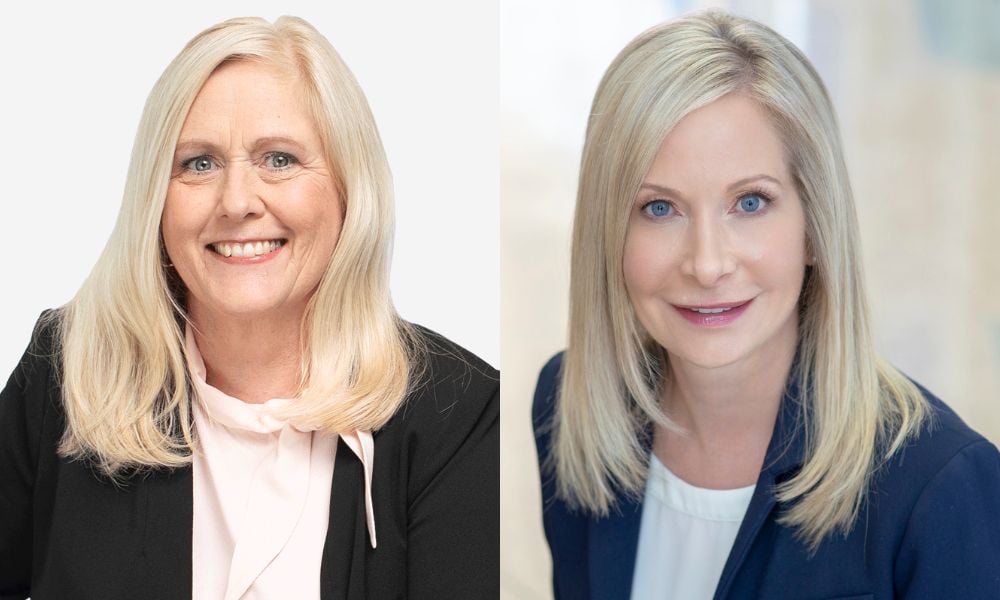
Finance industry insiders, including BMO's chief talent officer, reveal how they're navigating the 'great resignation'

The wealth industry is not immune to post-pandemic hiring struggles, but three industry insiders say companies that are concerted about defining who they are and what they can offer can still attract and retain good staff.
Grant White, portfolio manager of Winnipeg-based Endeavour Wealth Management, iA Private Wealth, told Wealth Professional the "great resignation" is a reality for the industry and that firms need to think beyond traditional compensation to keep people happy. "Corporate culture and values are more important than ever,” he said. "Good advisors and staff are always hard to find, but if you are compensating well, you will have opportunities.”
Karen Collins(pictured right), the chief talent officer at BMO Financial Group, agreed that a strong brand with a defined purpose and values plus flexible work arrangements can still attract the best talent. “That’s been helping us compete in what I would say has been, for the last little while, probably the biggest war for talent that most of us have seen,” she said. “It’s been a challenging time.”
She said one important learning, post-pandemic, is acknowledging that “it’s not a one-size-fits-all model". During the pandemic, BMO had 15,000 people working from the office and 30,000 working from home, but it’s still offering flexibility. While young parents or those working in a more rural location may be opting to work from home, others are engaging a hybrid model. She also noted that while millennials want more flexibility, BMO’s older staff is returning to work and in-person contact, and said staff attraction and retention now is about more than jobs.
“When you think about the commoditized nature of jobs in the world now, particularly given that many people can work anywhere, the talent’s really in the driver’s seat. But what we have, being a big bank, is not only the jobs people want, but a culture where people feel they can do more than just have a career. We want to help our customers build a financial future, but it goes beyond that.
“So, our employees can contribute to their community. They can spend time with their families. They can think about a net-zero world, an inclusive society, a sustainable future, and a thriving economy. As head of talent at BMO, I’m particularly proud that we have a special recipe that makes people really feel supported by our culture.”
BMO has also been taking other measures. It recently scaled up its talent acquisition team and started making offers quickly before others could scoop up candidates. It has announced a pay increase for its lower-graded employees and is increasing its online learning so staff can keep their professional credentials fresh as well as develop new skills, especially in technology.
“It’s making sure that the people we hire feel like their careers are being well supported at BMO,” said Collins. “That’s really making sure that, once you make the investment to bring people into your company, you’re doing all the things to make them feel cared for, valued, and recognized.”
Nicola Wealth has taken a similar approach to defining its purpose, values, and culture, and actively seeking the best fit. It hired 200 staff during the last two years of the pandemic.
“Recruiting experienced, planning-focused advisors who will embrace our planning model and culture is always a long, and sometimes challenging, process,” said Heather Claridge(pictured left), Nicola Wealth’s senior vice-president of people and culture. “We don’t feel that the ‘great resignation’ has negatively impacted our ability to attract advisors.”
But she added: “Regardless of what industry you’re in, when you look at the employment market right now, if you’re not paying attention to that employee experience, you’re going to be in trouble in terms of retention. In finance, it’s important to stress that the experience that the employees have will very much impact the end client experience. So, the closer you are to the client, the more essential it is to make sure that the employee, culture, and client experiences are all aligned.”
Claridge stressed that Nicola’s culture values constant learning, high-caring, collaboration, and innovation. She also emphasized that it “shares the pie” with employees, clients, and the community. That includes sharing the thought leadership as well as the organization’s financial success, which it also shares with communities that need its support since its volunteer community committee also receives a percentage of the firm’s profit. Many advisors have also been attracted by the fact that they get regular stock option grants and the opportunity to be an owner as part of its profit-sharing model, which also forms a percentage of employees’ base salary.
“When the organization wins, the clients win, and the people in our communities win. That’s the share-the-pie mentality,” she said. “What has challenged our recruitment is both current market conditions and potential advisors not understanding how lucrative our compensation model is.”
“There isn’t one profile of a person who fits, but they have to be aligned with our values,” said Claridge. “We’re really proud of our culture. It is our secret sauce.”
White added that although he recently hired three new people, it took an "extensive" search to find one of them. And he believes the current recruitment challenges are symptomatic of a bigger problem in wealth management. "We’re not doing enough to educate university-aged people about the industry. We’re not attracting enough young people into it.”